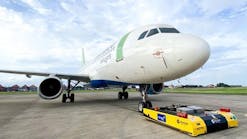Undetected Aircraft Maintenance Error Led to Loss of Control and Collision With Terrain at London International Airport, Ontario
Today, the Transportation Safety Board of Canada (TSB) released its investigation report (A22O0060) into the 2022 aircraft loss of control and collision with terrain at the London International Airport, Ontario.
On 25 May 2022, a Diamond Aircraft Industries GmbH DA 42 NG aircraft departed from London International Airport, Ontario, on a local test flight following a major overhaul that had been completed at the Diamond Aircraft Industries Inc. facilities at the airport.
Shortly after takeoff, the United States-registered aircraft yawed abruptly to the left. The pilot attempted to correct the unexpected yaw but had difficulty maintaining directional control of the aircraft. The pilot then attempted to make an emergency landing on Runway 27. However, during the approach, the pilot continued to have difficulty controlling the aircraft and instead attempted to land on Taxiway A before ultimately landing on the grass between the runway and the taxiway. The pilot was not injured. The aircraft was substantially damaged.
The investigation determined that the installation of the rudder cable guide tubes was done without the aid of specific procedures, guidance, or supervision. As a result, the rudder cable guide tubes were installed incorrectly, running parallel to each other instead of crossing over at the rear of the fuselage as prescribed in the airplane maintenance manual. When the rudder cables were threaded through the rudder cable guide tubes, they also ran in parallel when connected to the rudder lower mounting bracket in the rear of the aircraft. As a result, the rudder moved in the direction opposite to the pilot’s input. Since it is very difficult to see the rudder surface from the cockpit, and the rudder pedals from the tail area, the flight control portions of the annual and pre-flight inspections, which were accomplished by a single individual, did not identify that the rudder was rigged in reverse.
The investigation also determined that if procedures requiring the inspection of flight controls do not provide specific instructions regarding how to ensure the rudder surface is moving in the correct direction, flight controls that have been rigged in reverse may not be recognized.
See the investigation page for more information.


